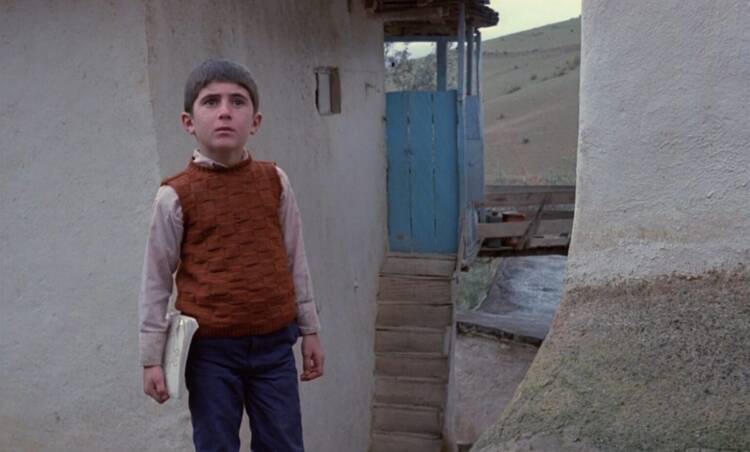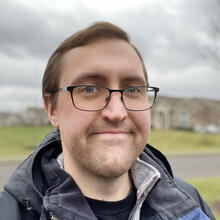Peter Maurin, the co-founder of the Catholic Worker movement, once said that the purpose of its work must be “to create a society where it will be easier for men to be good.” There’s a social diagnosis in that statement: People don’t do the wrong thing just because they want to, but because our culture doesn’t incentivize doing good. We are expected to focus on our own success and survival, and let everyone else worry about theirs. When self-interest is seen as the reasonable, responsible course of action, it becomes difficult to achieve even the simplest selfless acts.
Take, for example, Abbas Kiarostami’s 1987 film “Where Is the Friend’s House?” A young boy, Ahmad (Babak Ahmadpour) realizes that he has accidentally taken his friend Mohammad Reza (Ahmed Ahmadpour)’s notebook home from school. Their overbearing teacher has threatened to expel Reza if he doesn’t complete his homework in the notebook. Ahmad has never been to Reza’s house, but knows that he lives one village over, a few minutes’ walk. He resolves to find Reza and return the notebook.
Easy enough, right? Except Ahmad encounters obstacles from a world that doesn’t value or even understand such a simple act of kindness, turning his short trip into a sprawling odyssey. Doing good, he finds, isn’t easy at all.
Kiarostami, who passed away in 2016, was a major figure of Iranian New Wave cinema, a movement that began before and persisted after the 1979 Iranian Revolution despite increased censorship. He became famous for films that blended documentary and fiction in fascinating ways and for the visual poetry of his films. But his early movies were, like “Where Is the Friend’s House?”, largely moral tales made for children (but with a keen awareness of the adults in the audience).
In Kiarostami’s films, children have a moral clarity that supposedly older and wiser adults lack. Indeed, adults are Ahmad’s primary obstacles in returning Reza’s notebook. His mother tells him to focus on his homework while repeatedly calling him away to help with chores. His grandfather sends him on a pointless (but supposedly character-building) errand to get cigarettes. Others are too wrapped up in their own work to hear when he asks for help. When he encounters an adult’s indifference, Ahmad repeatedly offers the same argument: “I need to return my friend’s notebook. He’ll get in trouble if I don’t.” As the film goes on, you start to wish he had a little more guile, that he could come up with a better story that might break through the adults’ indifference. But that’s just further evidence of his essential innocence: Why wouldn’t doing the right thing, helping a friend in need, be argument enough?
Which is not to say that Kiarostami’s adults are willfully against the good. They’re carrying their own burdens, weighed down by the daily concerns of living. Ahmad’s teacher, for example: a stickler for discipline who also regularly arrives late to work and expects his students’ understanding and patience. Maybe he runs late because he has a sick relative or children of his own to care for; we don’t know. His failure isn’t that he doesn’t practice the discipline that he preaches, it’s that he can’t extend to others the same mercy he expects for himself.
Eventually, Ahmad realizes that none of the adults he meets—even the well-meaning ones—will be able to help him. The reasonable thing to do would be to give up. But Ahmad realizes he has another way to help his friend, even though it will come at a personal cost. It’s a simple, quiet act —and all the more heroic because of it.
The message of “Where Is the Friend’s House?” is evergreen, and it’s never a bad time to discover or revisit Kiarostami’s lyrical filmmaking. But I also have to confess that I chose an Iranian film this week because of our current conflict with that nation. When I watched the movie last week, threats were flying; by the time I sat down to write this, the first bombs had fallen. As I write this, we exist in a tenuous cease-fire that might easily explode back into violence.
When we talk about the countries that are our “enemies,” we tend to focus on their leaders’ failures, or the things that we find strange or dangerous about them. In short, we dehumanize them—and the only purpose in dehumanizing an enemy is to make them easier to kill. As we stand on the brink of all out war, I think it’s worthwhile to look into the faces that Kiarostami captures with such sensitivity and detail in this film, especially the children. If our conflict with Iran escalates, these are the people who our bombs will fall on, whose lives will be cut short. People as real as you and I, children whose lives are as precious as my children’s.
We have not yet created a society where it is easy for people to be good. Maybe we can start by rejecting fear, hatred and dehumanization, and seeking peaceful solutions to the world’s many conflicts. These are not easy things to do. But in a world where it’s not easy to do good, good is the only thing worth doing.
“Where Is the Friend’s House?” is streaming on the Criterion Channel.








